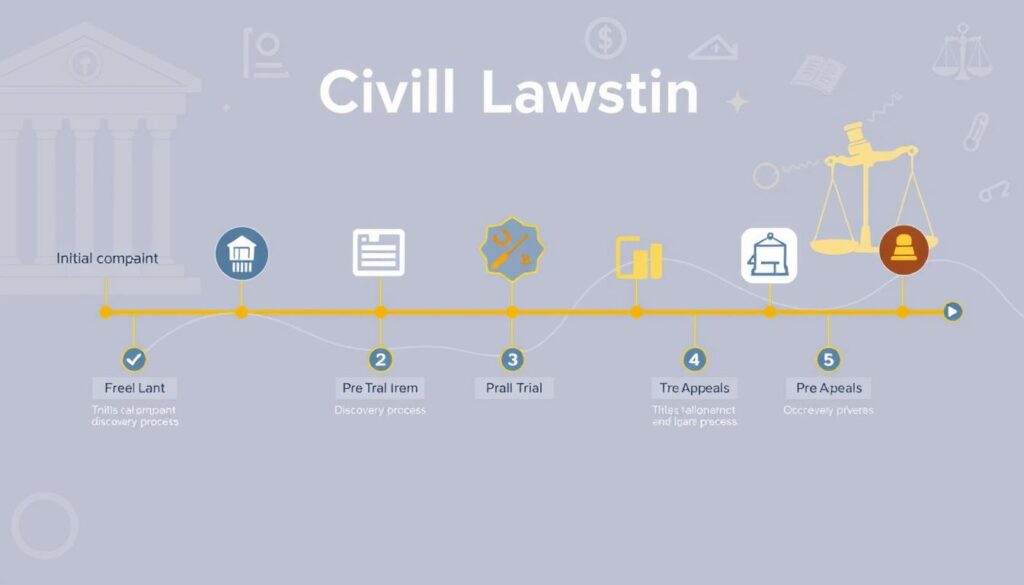Getting caught up in a civil dispute can feel overwhelming. You might be dealing with a personal injury claim, a contract issue, or another civil lawsuit. An experienced civil litigation attorney can be a game-changer. They know how to guide you through the complex legal process, making sure your rights are looked after and your case is well-presented.
Civil litigation covers many areas, like business disagreements, real estate problems, employment issues, and consumer disputes. A skilled civil suit lawyer offers the advice and support you need for a good outcome. They use their knowledge of the law, find the best legal approaches, and negotiate or prepare for trial. This can greatly boost your chances of winning your case.
Key Takeaways
- Hiring a civil litigation attorney is crucial when facing complex legal disputes
- Civil lawyers possess the specialized knowledge and experience to navigate the intricacies of civil lawsuits
- Civil litigation covers a wide range of cases, from personal injury to business disputes
- A skilled civil suit lawyer can improve your chances of a favorable outcome through effective legal strategies and negotiation
- The right civil litigation attorney can protect your rights and interests throughout the legal process
Understanding Civil Litigation and When You Need Legal Representation
Civil litigation is a legal process for disputes between people, groups, or entities. These disputes can come from many issues, like contract problems, personal injuries, or property rights. It’s complex and often needs a legal expert for a good outcome.
Types of Civil Cases Handled by Litigation Attorneys
Litigation attorneys can handle many civil cases. These include:
- Personal injury claims, such as car accidents, slip and falls, or medical malpractice
- Breach of contract disputes, like business agreements, real estate deals, or consumer contracts
- Intellectual property disputes, such as copyright or trademark issues
- Landlord-tenant disputes, including evictions or security deposit issues
- Probate and estate disputes, like will contests or trust disagreements
Signs It’s Time to Hire a Legal Professional
Here are signs you might need a civil litigation attorney:
- You’ve been served with a lawsuit or legal notice.
- You’re thinking about filing a lawsuit against someone.
- You’re dealing with a complex legal issue you can’t handle alone.
- You’re not sure about your legal rights or the civil litigation process.
Initial Steps in Civil Litigation
The civil litigation process starts with filing a lawsuit, called a complaint or petition. This document explains the alleged wrongdoing and what relief is sought, like money damages or an injunction. After the complaint is filed, the defendant must respond, and the discovery process starts. This is where both sides share information and evidence. The case might settle, go through mediation, or be tried in court.
i need a civil suit lawyer: Essential Guide to Finding the Right Attorney
Finding the right attorney for a civil lawsuit is key to success. The process might seem hard, but focusing on specialization, experience, and reputation helps. This way, you can choose the right lawyer for your case.
Start by researching attorneys who specialize in civil litigation. Look for lawyers who have handled cases like yours. Specialization means they know civil law well and can handle its complexities.
Then, examine the prospective attorney’s experience. Check how long they’ve been practicing and their past case results. An experienced lawyer can better anticipate and solve problems in your case.
Lastly, consider the attorney’s reputation. Read online reviews, ask for references, and look for awards. A good lawyer will represent you well, communicate clearly, and keep you updated on your case.
By carefully attorney selection, you can find the best lawyer for your civil suit. This choice can greatly impact your case’s success. Remember, the right lawyer can make a big difference.
“Finding the right attorney can be the difference between a successful civil suit and a disappointing outcome. Take the time to research and select an attorney with the legal expertise and experience to effectively represent your interests.”
Qualifications and Experience to Look for in a Civil Litigation Attorney
When looking for a civil litigation attorney, consider their education, certifications, and success in similar cases. Also, check their professional affiliations and recognition. These details show an attorney’s skills and ability to handle complex cases.
Educational Background and Certifications
Choose attorneys with a Juris Doctor (J.D.) degree from a recognized law school. Certifications from the National Board of Trial Advocacy (NBTA) or the American Board of Trial Advocates (ABOTA) show their expertise in civil litigation.
Track Record of Success in Similar Cases
Ask about the attorney’s experience in cases like yours. An impressive success rate and favorable outcomes show their legal skill and ability to win for clients.
Professional Affiliations and Recognition
- Check if the attorney belongs to top legal groups, like the American Bar Association (ABA) or state bar associations. These memberships show their commitment to professional growth and high legal standards.
- Also, look for recognition from respected legal publications or peer-reviewed awards. This validation confirms their qualifications, experience, and industry reputation.
By examining an attorney’s education, certifications, success, and affiliations, you can make a smart choice. You’ll feel confident they can represent your interests well in civil litigation.
The Cost of Hiring a Civil Suit Attorney: Fee Structures Explained
When you face a civil lawsuit, the cost of legal help is a big worry. It’s important to know how attorneys charge for their work. This helps you plan your legal expenses better.
Hourly Rates
Many lawyers charge by the hour. This means you pay for the time they spend on your case. Rates can go from $150 to $500 or more. This depends on the lawyer’s experience and where they are located.
Contingency Fees
Contingency fees mean the lawyer only gets paid if you win. They usually take a share of the money you get, like 30-40%. This is good if you can’t pay for a lawyer upfront.
Flat Fees
Some lawyers offer flat fees for certain jobs. For example, they might charge a set price for a contract or a simple settlement. This makes costs clearer and easier to predict.
Retainer Agreements
Most lawyers ask for a retainer agreement before starting work. This is a payment that covers the start of the case. It’s used to pay for the lawyer’s time and expenses. The retainer is then taken off the total cost as the case goes on.
Choosing a lawyer means understanding how they charge. Knowing the fee structure helps you plan your budget. This way, you can make a smart choice about your legal representation.
| Billing Method | Description | Typical Range |
|---|---|---|
| Hourly Rates | Fees based on the attorney’s time spent on the case | $150 – $500+ per hour |
| Contingency Fees | Compensation contingent on the successful outcome of the case | 30% – 40% of the settlement or award |
| Flat Fees | Fixed-price legal services for specific tasks | Varies based on the complexity of the task |
| Retainer Agreements | Upfront payment to secure the attorney’s services | $500 – $5,000+ |

“Understanding the various fee structures used by civil suit attorneys is crucial in managing your legal expenses and making an informed decision about legal representation.”
How Civil Litigation Lawyers Prepare and Handle Your Case
When you hire a civil litigation lawyer, they start a detailed process. They do a thorough case investigation, evidence collection, legal strategy development, and settlement negotiations. Let’s dive into these important steps.
Case Investigation and Evidence Gathering
The first step is a deep case investigation. Your lawyer will look into the facts, check important documents, and collect evidence. They might talk to witnesses, get records, and consult experts to strengthen your case.
Legal Strategy Development
With the information in hand, your lawyer will craft a solid legal strategy. They’ll analyze the evidence, spot legal issues, and plan the best way to win. Your lawyer will prepare for challenges and come up with solutions.
Settlement Negotiations
Many cases settle before going to trial. Your lawyer will talk to the other side to find a deal that works for you. Their negotiation skills and legal knowledge are key to a good settlement process.
Your civil litigation lawyer will fight for your rights and help you succeed. They’ll guide you through the legal world. With their hard work and knowledge, you can trust them to handle your case well.
Timeline of a Civil Lawsuit: What to Expect
Going through the legal system can feel overwhelming, especially if you’re new to it. Knowing about the lawsuit duration and court process in a civil lawsuit can help. It prepares you for what’s to come.
In a civil case, the legal proceedings follow a clear path. Each case milestone is key to the case’s outcome. From the complaint filing to appeals, the time frame changes based on the case’s complexity and where it’s heard.
- Filing the Complaint: The first step is filing the complaint. It states the plaintiff’s grievances and what they want.
- Service of Process: The defendant must be served with the complaint and summons. This starts their role in the legal proceedings.
- Responsive Pleadings: The defendant has a deadline to respond. They can file an answer, a motion to dismiss, or other legal actions.
- Discovery Phase: This stage is crucial. It’s when both sides share information, documents, and witness statements. It helps build their cases.
- Pretrial Motions: Before the trial, parties file motions. These can limit the court process.
- Trial: At the trial, both sides present their evidence and arguments. A judge or jury decides the outcome.
- Post-Trial Motions and Appeals: If one side loses, they might file post-trial motions or appeals. This can extend the lawsuit duration.
Knowing the typical timeline of a civil lawsuit helps set realistic expectations. It prepares you for the legal proceedings ahead. With an experienced civil litigation attorney, you can better navigate the court process and get a good outcome for your case.

“The legal proceedings in a civil case can be complex and time-consuming. But with the right legal help, you can get through the court process and find a favorable resolution.”
Rights and Responsibilities When Working with Your Attorney
When you hire a civil litigation attorney, it’s key to know your rights and duties. These include keeping secrets and talking clearly with your lawyer. These steps help make your legal team work well together.
Client-Attorney Privilege
The attorney-client relationship is built on a key idea: privilege. This means your lawyer can’t share what you tell them with others without your okay. This keeps your legal matters private and lets you talk freely with your lawyer.
Communication Guidelines
- Keep in touch with your lawyer, sharing news and answering their questions fast.
- Be truthful about your case, so your lawyer can plan the best strategy.
- Ask any questions you have about the legal process. Don’t worry about asking for help with tough stuff.
Document Preparation Requirements
You’re important in getting your case documents ready. This might include financial records, contracts, emails, and other key evidence. Giving your lawyer all the documents you have helps your case move faster.
| Legal Rights | Client Responsibilities |
|---|---|
| Confidentiality | Honest and transparent communication |
| Informed decision-making | Timely document preparation |
| Ethical representation | Prompt response to attorney inquiries |
Knowing your rights and doing your part as a client helps you and your lawyer work well together. This teamwork is key to winning your case.
Common Mistakes to Avoid When Filing a Civil Suit
Dealing with civil lawsuits can be tough. Even a small mistake can hurt your case. One big mistake is missing filing deadlines. If you don’t file important documents on time, your case might get thrown out.
It’s key to work closely with your lawyer. They can help make sure all papers are filed correctly and on time.
Another mistake is not collecting enough evidence. A strong case needs good documentation, like witness statements and financial records. If you don’t gather enough evidence, it’s hard to prove your point. Your lawyer will help you find and organize the right evidence.
Not talking well with your lawyer is another mistake. Civil lawsuits are complex and take a lot of time. It’s important to keep in touch with your lawyer. If you don’t share important information or answer questions, your lawyer can’t help you as much.
